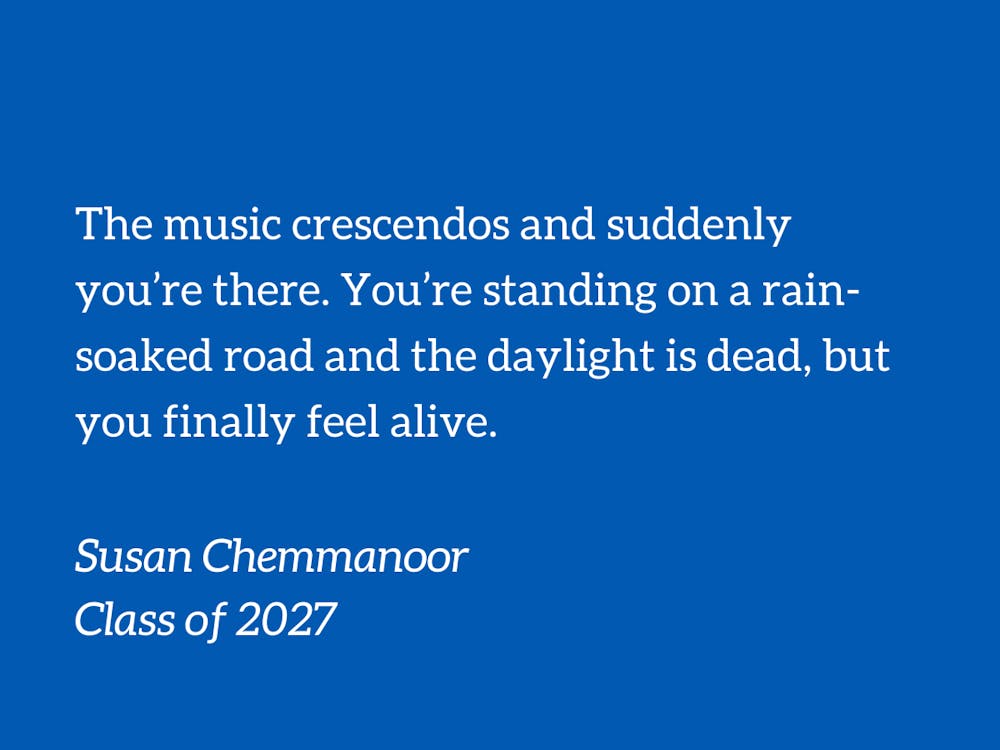When I first started listening to Mitski in 2019, I felt like I had discovered a prophet.
Her lyrics felt like diary entries stolen from a night I had felt a little too honest. “Your Best American Girl” poked at the soft underbelly of insecurity I didn’t know I had. “A Burning Hill” made me rethink my relationship with work. Her music was a form of escapism.
“Pink in the Night” was an especially spiritual experience. The first lines feel timid. The way the synth holds its high pitch in the background of Mitski’s terrified confession “I’ve been blossoming alone over you” is what holding your breath feels like. But then the levee breaks, and Mitski’s real feelings come pouring out. The synth drops away to reveal her unabashed truth: “I love you, I love you, I love you.” The music crescendos and suddenly you’re there. You’re standing on a rain-soaked road and the daylight is dead, but you finally feel alive. You feel the drums banging like a heartbeat in your sternum. Mitski’s voice is thunderous in your ears. She’s screaming for you to “try again and again and again.” The song makes love feel like a physical necessity. Vulnerability felt powerful.
I was so emotionally invested in her music, that I started to feel a sort of strange ownership over it. I was naively convinced that no one understood her music like me. That emotional delusion lies at the core of music snobbery: feeling undeserved pride in listening to a non-mainstream artist.
That music egoism is personified in Spotify Wrapped. On Nov. 29, 2023, the bell tolled for music lovers everywhere. The ground shook and fauna fled; it was Judgement Day. Spotify Wrapped had finally been delivered. It was a harrowing day for some: Drake deniers everywhere were “shocked” and “confused” seeing “IDGAF” in their top songs. But it was a joyous day for others, a data-supported validation for their insanely esoteric music taste. A chance to tell everyone they know they were in the 0.01% of Grimes listeners. It was cold, hard proof that they were special.
And it’s entirely understandable, we all yearn to be different, to be unique. There is pride in exclusivity. We selfishly want complete ownership of the niche interests that feel so personal to us. When Mitski’s “Strawberry Blond” started to go viral on TikTok, I was so inexplicably angry. It was as if a personal sanctuary had been discovered and exploited.
But Mitski doesn’t make music for only me. Mitski writes music for people who have been born anew. People who have been tugged and tugged until they’ve been broken and forced into restitching themselves — vein by vein, cell by cell. She makes music for the broken-hearted and people so hopelessly in love they don’t recognize themselves anymore. She makes her music for the jaded who feel like they’ve been forgotten by life itself. She sings for the joyous — people who have the sun bursting from the cavity where their hearts should be.
She makes music for anyone who wants to listen. And isn’t that the point?
Not to get all sentimental on you, but isn’t music more fun together? Screaming “Tongue Tied” by Grouplove in a friend-filled car is fun. Yelling “The Spins” by Mac Miller down a highway feels good. There’s joy hiding in the Spotify link you send to a friend. Pride glows in your chest as you watch a friend fall in love with your favorite artist. Life is better when everyone knows the song.
Alternative music is not made to make people feel bad about listening to pop. It’s not made to form superiority complexes about only listening to shoegaze. Music is made to create community. It’s made to force you to feel. But, most of all, it is made to be enjoyed with the people you love, without judgment.
So, if you’re going to be a music snob, at least be a nice one.
Susan Chemmanoor is a Trinity first-year. Her column typically runs on alternate Fridays.
Get The Chronicle straight to your inbox
Sign up for our weekly newsletter. Cancel at any time.
Susan is a freshman in Trinity. Her columns run on alternate Fridays.

